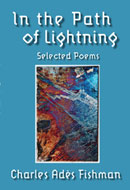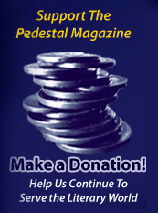Emily O'Neill - Under Fresh ...
Christine Potter - On Holy S ...
Robert Haynes - Idea of Odor ...
David Salner - Survival of t ...
Kit Kennedy - Instructions t ...
Roger Aplon - The Street Ins ...
Lesley Kimball - Empty Plank ...
Jennifer Givhan - Mistaken f ...
Sean Lause - Find the object
Pamela L. Taylor - The Truth ...
Meg Cowen - Iíll Explain the ...
Michael Johnson - Ice

|
|
|
 In the Path of Lightning
In the Path of Lightning

